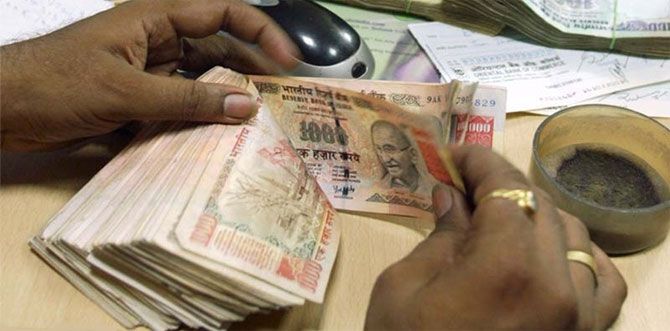 Non-Resident Indians and Indian nationals abroad can deposit up to Rs 25,000 of the demonetised currency during the 3-6 month grace period, but only if they show the junked notes to Customs officials at the airport and get a declaration form stamped.
Non-Resident Indians and Indian nationals abroad can deposit up to Rs 25,000 of the demonetised currency during the 3-6 month grace period, but only if they show the junked notes to Customs officials at the airport and get a declaration form stamped.
The declaration will have to be submitted at specified branches of the Reserve Bank while depositing the junked currency, a finance ministry notification stated.
While the 50-day window for such deposits at banks or post offices ended on December 30, the government has offered a grace period for those who were abroad.
The window for Indian nationals who were travelling abroad is till March 31 and for NRIs, it is June 30, 2017. This facility, however, is “subject to the Foreign Exchange Management (Export and Import of Currency) Regulations, 2015. As per these regulations, bringing back such currency into the country is restricted to Rs 25,000 per person”.
Those returning from Nepal and Bhutan are not permitted to carry specified bank notes of old 500 and 1,000 rupee notes.
“For the period from up to March 31, 2017 or June 30, 2017, as applicable, a declaration form will need to be filled by resident Indians and non-resident Indians coming to India and carrying SBNs for depositing these SBNs in the specified offices of RBI in India,” the notification said.
“At the airport/land Customs stations etc on entry, Customs stamp on the said forms shall be affixed and the same shall be submitted along with other documents to RBI offices.”
A one-page form has been worked out for the purpose.
Since the form to be filled in by the passenger bearing the Customs stamp will be crucial in subsequently facilitating the deposit of SBNs at the specified issue offices of RBI, the finance ministry asked the customs formations to keep a copy of the same, preferably in a scanned format.
“The Customs officer shall strictly count the number of notes and tally the total amount mentioned before stamping the form submitted by the passenger,” the notification said.
The ministry said since it is a facilitation step to enable resident and non-resident Indians to deposit SBNs when they arrive in India, measures should be taken to make passengers and airlines aware of the new dispensation.
“While discharging the above task, care may be taken that due courtesy is extended to the declarants and that no unnecessary inconvenience is caused,” it said.
The government had declared 500 and 1,000 denomination bank notes as illegal tender from November 9, 2016. Subsequently, the President approved the promulgation of the Specified Bank Notes (Cessation of Liabilities Ordinance) Ordinance, 2016 on December 30.
“The ordinance imposes penal liabilities on the holders of SBNs after the specified date,” the notification said.
It makes holding, transfer and receiving of the demonetised notes a criminal offence, punishable with a fine of Rs 10,000 or five times the cash held, whichever is higher.
“The details of the declaration and statements that are required to be submitted along with the SBNs at the time of deposit in RBI issue offices will be separately announced by RBI. Any false declaration will invite a fine of Rs 50,000 or five times the amount of the face value of the SBN tendered, whichever is higher,” a ministry statement had said after the Ordinance was promulgated on Friday.










 © 2025
© 2025